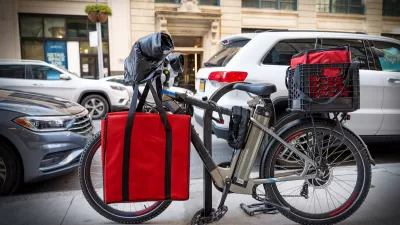Cargo bike producers and delivery companies say the proposed 120-inch length limit and emphasis on four-wheeled bikes excludes many commonly used delivery bikes and favors one manufacturer.

When the New York City Department of Transportation (NYCDOT) announced a proposed rule revision that would make way for larger cargo bikes in the city, bike advocates hailed it as a victory. But freight industry leaders say the change would outlaw some of the most common delivery bikes and skew the market toward one particular manufacturer, writes Gersh Kuntzman in Streetsblog NYC.
The new rules would explicitly allow four-wheeled, pedal-assist cargo bikes—just the kind that the city’s Department of Transportation is testing. But, as Kuntzman explains, “Those bikes are made by Fernhay, which is owned by a well-connected lawyer, William Wachtel.”
Kuntzman points out that “Industry leaders who were not Wachtel believe that the well-connected lawyer has some undue influence over the Adams administration — though such speculation is common when one company’s design is chosen over others’.”
According to Ben Morris of Boaster Cycles, “The 120-inch cap is going to eliminate all bike-and-trailer cargo solutions that currently operate in the market today and in the future.” The CEO of Net Zero Logistics said, “the suggested limit of 120 inches will force us to shut down, completely reengineer our operations or return to using vans for delivery.”
NYCDOT will hold just one public hearing on the issue on September 13.
FULL STORY: Industry Leaders Slam DOT’s Proposed Cargo Bike Rules

Alabama: Trump Terminates Settlements for Black Communities Harmed By Raw Sewage
Trump deemed the landmark civil rights agreement “illegal DEI and environmental justice policy.”

Planetizen Federal Action Tracker
A weekly monitor of how Trump’s orders and actions are impacting planners and planning in America.

Why Should We Subsidize Public Transportation?
Many public transit agencies face financial stress due to rising costs, declining fare revenue, and declining subsidies. Transit advocates must provide a strong business case for increasing public transit funding.

Understanding Road Diets
An explainer from Momentum highlights the advantages of reducing vehicle lanes in favor of more bike, transit, and pedestrian infrastructure.

New California Law Regulates Warehouse Pollution
A new law tightens building and emissions regulations for large distribution warehouses to mitigate air pollution and traffic in surrounding communities.

Phoenix Announces Opening Date for Light Rail Extension
The South Central extension will connect South Phoenix to downtown and other major hubs starting on June 7.
Urban Design for Planners 1: Software Tools
This six-course series explores essential urban design concepts using open source software and equips planners with the tools they need to participate fully in the urban design process.
Planning for Universal Design
Learn the tools for implementing Universal Design in planning regulations.
Caltrans
Smith Gee Studio
Institute for Housing and Urban Development Studies (IHS)
City of Grandview
Harvard GSD Executive Education
Toledo-Lucas County Plan Commissions
Salt Lake City
NYU Wagner Graduate School of Public Service





























